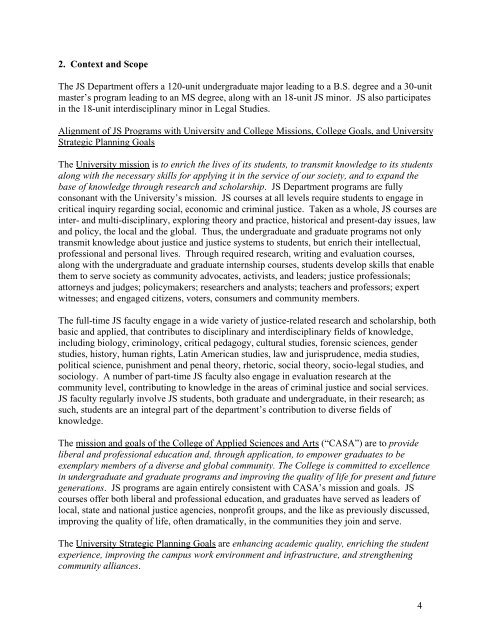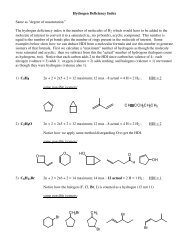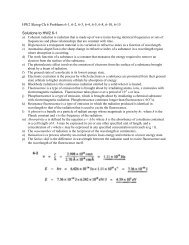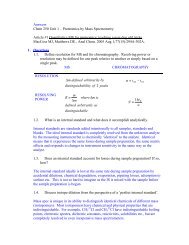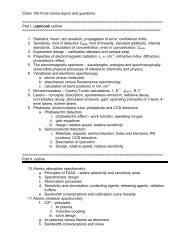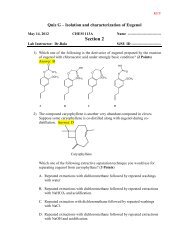Justice Studies - Department of Chemistry - San Jose State University
Justice Studies - Department of Chemistry - San Jose State University
Justice Studies - Department of Chemistry - San Jose State University
You also want an ePaper? Increase the reach of your titles
YUMPU automatically turns print PDFs into web optimized ePapers that Google loves.
2. Context and ScopeThe JS <strong>Department</strong> <strong>of</strong>fers a 120-unit undergraduate major leading to a B.S. degree and a 30-unitmaster’s program leading to an MS degree, along with an 18-unit JS minor. JS also participatesin the 18-unit interdisciplinary minor in Legal <strong>Studies</strong>.Alignment <strong>of</strong> JS Programs with <strong>University</strong> and College Missions, College Goals, and <strong>University</strong>Strategic Planning GoalsThe <strong>University</strong> mission is to enrich the lives <strong>of</strong> its students, to transmit knowledge to its studentsalong with the necessary skills for applying it in the service <strong>of</strong> our society, and to expand thebase <strong>of</strong> knowledge through research and scholarship. JS <strong>Department</strong> programs are fullyconsonant with the <strong>University</strong>’s mission. JS courses at all levels require students to engage incritical inquiry regarding social, economic and criminal justice. Taken as a whole, JS courses areinter- and multi-disciplinary, exploring theory and practice, historical and present-day issues, lawand policy, the local and the global. Thus, the undergraduate and graduate programs not onlytransmit knowledge about justice and justice systems to students, but enrich their intellectual,pr<strong>of</strong>essional and personal lives. Through required research, writing and evaluation courses,along with the undergraduate and graduate internship courses, students develop skills that enablethem to serve society as community advocates, activists, and leaders; justice pr<strong>of</strong>essionals;attorneys and judges; policymakers; researchers and analysts; teachers and pr<strong>of</strong>essors; expertwitnesses; and engaged citizens, voters, consumers and community members.The full-time JS faculty engage in a wide variety <strong>of</strong> justice-related research and scholarship, bothbasic and applied, that contributes to disciplinary and interdisciplinary fields <strong>of</strong> knowledge,including biology, criminology, critical pedagogy, cultural studies, forensic sciences, genderstudies, history, human rights, Latin American studies, law and jurisprudence, media studies,political science, punishment and penal theory, rhetoric, social theory, socio-legal studies, andsociology. A number <strong>of</strong> part-time JS faculty also engage in evaluation research at thecommunity level, contributing to knowledge in the areas <strong>of</strong> criminal justice and social services.JS faculty regularly involve JS students, both graduate and undergraduate, in their research; assuch, students are an integral part <strong>of</strong> the department’s contribution to diverse fields <strong>of</strong>knowledge.The mission and goals <strong>of</strong> the College <strong>of</strong> Applied Sciences and Arts (“CASA”) are to provideliberal and pr<strong>of</strong>essional education and, through application, to empower graduates to beexemplary members <strong>of</strong> a diverse and global community. The College is committed to excellencein undergraduate and graduate programs and improving the quality <strong>of</strong> life for present and futuregenerations. JS programs are again entirely consistent with CASA’s mission and goals. JScourses <strong>of</strong>fer both liberal and pr<strong>of</strong>essional education, and graduates have served as leaders <strong>of</strong>local, state and national justice agencies, nonpr<strong>of</strong>it groups, and the like as previously discussed,improving the quality <strong>of</strong> life, <strong>of</strong>ten dramatically, in the communities they join and serve.The <strong>University</strong> Strategic Planning Goals are enhancing academic quality, enriching the studentexperience, improving the campus work environment and infrastructure, and strengtheningcommunity alliances.4


